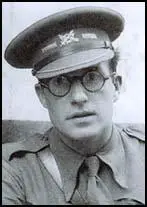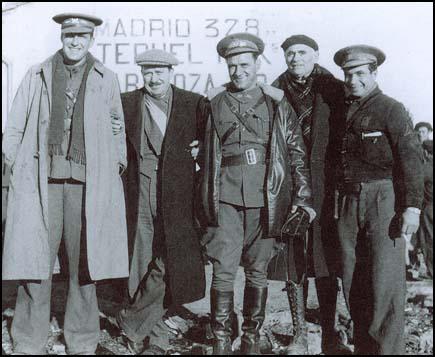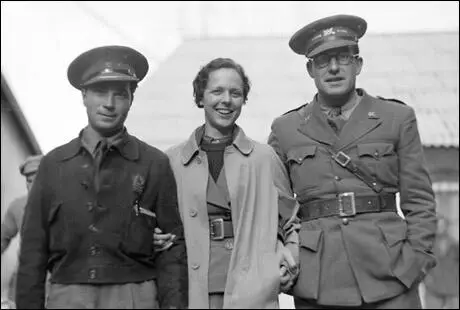Robert Merriman

Robert Merriman, the son of a lumberjack, was born in the United States on 17th November 1908. While studying economics at University of Nevada he spent two years in the Reserve Officers' Training Corps because it paid seven and a half dollars a month. He also worked as a ranch hand, cement worker and pulp feeder to help finance his studies.
After completing his studies Merriman began teaching at University of California. While in California he became active in left-wing politics and supported the San Francisco General Strike. Merriman also won the Newton Booth Travelling Fellowship. This enabled him to study agricultural problems in different countries in Europe.
In 1937 Merriman joined the Abraham Lincoln Battalion, a unit that volunteered to fight for the Popular Front government during the Spanish Civil War. He joined the other International Brigades at Albacete and as he spent two years in the Reserve Officers' Training Corps at the University of Nevada, he was recruited to train recently arrived volunteers from America.
Working under James Harris, a former sergeant in the United States Army, Merriman taught the men how to fieldstrip rifles and machine-guns. He also organized a series of lectures on scouting, fortifications and signaling.
His wife, Marion Merriman, joined him in Spain and became the only woman to become a full member of Abraham Lincoln Battalion. She served as an administrative officer until being sent home in November 1937 to begin a speaking tour of the United States.
After failing to take Madrid by frontal assault General Francisco Franco gave orders for the road that linked the city to the rest of Republican Spain to be cut. A Nationalist force of 40,000 men, including men from the Army of Africa, crossed the Jarama River on 11th February, 1937.

and David Doran at Fuentes de Ebro (1938)
General José Miaja sent three International Brigades to the Jarama Valley to block the advance. Led by Merriman, the 373 members of the brigade moved into the trenches on 23rd February. When the were ordered over the top they were backed by a pair of tanks from the Soviet Union. On the first day 20 men were killed and nearly 60 were wounded.
On 27th February 1937, Colonel Vladimir Copic, the Yugoslav commander of the Fifteenth Brigade, ordered Merriman and his men to attack the Nationalist forces at Jarama. As soon as he left the trenches Merriman was shot in the shoulder, cracking the bone in five places. Of the 263 men who went into action that day, only 150 survived. Merriman was now replaced by Oliver Law as battalion commander. It was the first time in American history that an integrated military force was led by an African-American officer.
When Merriman recovered from his wounds he was appointed as brigade chief of staff of the Mackenzie-Papineau Battalion. The next major action involving the International Brigades took place during the Aragón offensive at the end of August 1937. The campaign began with an attack on the town of Quinto. This involved dangerous street fighting against snipers that were within the walls of the local church. After two days the Americans were able to clear the town of Nationalist forces. This included the capture of nearly a thousand prisoners.

The Lincoln-Washington Battalion then headed towards the fortified town of Belchite. Once again the Americans had to endure sniper fire. Merriman ordered the men to take the church. In the first assault involving 22 men, only two survived. When Merriman ordered a second attack, Hans Amlie at first refused saying the task of taking the church was impossible. He help Amlie, Steve Nelson led a diversionary attack. This enabled the Lincoln-Washington Battalion to enter the town. The Americans suffered heavy casualties, Nelson and Amlie received head wounds and amongst the dead were Wallace Burton, Henry Eaton and Samuel Levinger.
In March 1938 Merriman returned to the Aragón front. Milton Wolff was now battalion commander and John Gates was battalion commissar. Later that month Robert Merriman was reported missing with David Doran while fighting at Gandesa. The following year Edwin Rolfe wrote in The Lincoln Battalion that they were killed by crossfire while on the road to Corbera on 2nd April, 1938.
Primary Sources
(1) Marion Merriman, American Commander in Spain: Robert Hale Merriman and the Abraham Lincoln Brigade (1986)
As we drove into Madrid, the first thing we saw was the big bullring - the Moorish architecture, arch upon arch, dusky brown with beautiful coloring in the tiles, the columns. It was magnificent, I thought. Entering Madrid was like entering any big city's industrial section. We drove through a ring of factories, then into the nicer part of the city.
'Even under bombardment, Madrid is marvelous!' I said to Bob. The wide tree-lined boulevards and modern buildings had an air of dignity that even blocks of bombed-out ruins could not dispel.
But the scene changed, quickly. As we walked down a broad boulevard, we heard the crack of rifle fire. Then the tempo picked up. 'That's machine gun fire,' Bob said. The machine-guns rattled in the distance, perhaps a few blocks away, I couldn't be sure. Then we heard the boom of artillery and the reality of Madrid at war returned deeply to me. The artillery shell landed some distance away, collapsing part of a building, which fell into a rubble of dust. We dashed down the street, staying close to the buildings. The horror of war was driven home to me. I was terrified.
I was shaking badly when we entered the Hotel Florida and went directly up the stairs to Hemingway's room. Bob steadied me, then knocked on the door.
'Hello, I'm Merriman,' Bob said as Hemingway, looking intense but friendly, opened the door.
'I know,' Hemingway said. Bob introduced me, and the writer greeted me warmly.
Then Hemingway and Bob fell into conversation about the war and the broadcast they planned. They were joined by John Dos Passos, Josephine Herbst, and a scattering of American volunteers and correspondents who sipped Hemingway's scotch and compared notes and stories. I slipped into an old chair, still quite shaken by the action outside.
I studied Bob and Hemingway. They got along. Each talked for a moment, then listened to the other. How different they were, I thought, Bob at twenty-eight, Hemingway at least a good ten years older. Hemingway seemed complex. He was big and bluff and macho. He didn't appear to be a braggart but he got across the message, through an air of self-assurance, that he could handle what he took on.
Bob was taller than Hemingway by several inches. They looked at each other through the same kind of round glasses, Bob's frames of tortoise shell, Hemingway's of steel.
Hemingway was animated, gesturing as he asked questions, scratching his scalp through thick dark hair, perplexed, then scowling, then, something setting him off, laughing from deep down. He wore a sweater, buttoned high on his chest, and a dark tie, loosened at the neck.
Bob was clean shaven. Hemingway needed a shave. He didn't appear to be growing a beard, he just seemed to need a shave, the scrubble roughing his cheeks and chin. He looked like he had had a hard night. He had a knot on his forehead, probably suffered in some roustabout skirmish.
Hemingway sipped a scotch, as did Bob. Someone offered me a drink, and I thought I'd never been as happy in my life to get a drink of whiskey. Even in the relatively safe room I remained frightened. The sheer madness of the war would not leave my mind.
As Bob and Hemingway talked, the contrast between them struck me time and again. Bob was an intellectual, and he looked like one. Hemingway was an intellectual, but he looked more like an adventurer. Bob looked like an observer. Hemingway looked like a man of action.
I was fascinated by Dos Passes, whom I had always thought was a better writer than Hemingway. John DOS Passes was, without question, a seasoned writer of the prose of war. But as a man, he didn't impress me. I thought he was wishy-washy. I couldn't make out everything he was saying, but his message was clear - for whatever reasons, he
wanted out of there, out of Hemingway's room, out of bomb-shaken Madrid.
I was scared too, with good reason. But somehow Dos Passes acted more than scared. I guessed it was his uncertainty, his facial expressions, his general attitude that this was a lost cause, given the superior strength of the Franco forces. Dos Passes criticized the Spanish Republic, for which Americans were fighting and dying.
Hemingway, on the other hand, let you know by his presence and through his writing exactly where he stood. Hemingway had told the world of the murder in Madrid, including the murder of children by fascist bombing. He had told about 'the noises kids make when they are hit. There is a sort of foretaste of that when the child sees the planes coming and yells "Aviacion!" Then, too, some kids are very quiet when they are hit - until you move them.'
(2) Robert Merriman diary entry (28th February 1937)
Boys had little to eat and drink, and it meant death to carry food across the road. We waited without promised machine gun support, without telephone, artillery going to the left and not helping us. The armored cars were behind the hill, no tank in evidence, no horses, no planes.
(3) Robert Merriman wrote about the offensive at Jarama Valley to his friend Martin Hourihan (1st March 1937)
Our men advanced under impossible conditions and did it without murmur. Our boys plenty brave. Great boys and it grieved me to see them go.
(4) Robert Merriman diary entry (2nd March 1937)
It was a butcher shop. People died on stretchers in the yard. Went to the operating room. Pulling bullets out of a man who had become an animal. Several doctors operating on stomach exploring for bullets while others died.
(5) Frank Ryan, The Fifteenth Brigade (1938)
Merriman was among the first Americans to arrive in Spain. He took an instrumental part in organizing the Lincoln Battalion and was its first Commander when the Battalion first went into action in the Jarama battles, being wounded in the attack on February 27.
Still convalescing, Merriman took charge of an Officers' Training School and later trained the Mackenzie-Papineau Battalion. Just before the Aragon offensive, he was appointed Chief of Staff.
An able organizer, ever teaching and learning, scrupulously attentive to details, combining the geniality and shyness of a college professor with the decisiveness of the athlete and military officer, Major Merriman has played an important part in raising the military efficiency of the Brigade, of the officers and the troops alike.
(6) Marion Merriman visited Belchite at the end of the offensive. She wrote about it in her book, American Commander in Spain: Robert Hale Merriman and the Abraham Lincoln Brigade (1986)
As Bob explained the battle to me, walking through the town's ruins, the shadows lengthened across the empty fields nearby. Here one of our best machine-gunners fell, beside that wall Burt was killed, there was Danny's grave, here Sidney fell, a sniper's bullet between his eyes, there Steve Nelson was wounded. Our losses were actually very low, but they included some of the best and most loved of our men.
As we passed a little factory, huge sewer rats scurried into a drain beside the road. They were as large as cats. Even though it was two weeks later, the smell of burned flesh still hung faint and nauseating in the cool dusk. Their forces far outnumbered ours, but the fascists had not even attempted to dispose of their dead. They had left hundreds of decaying corpses stacked in various buildings.
As we passed through the debris-filled streets, the air of desolation and death deepened. Homeless cats scuttled about, hungry, and dogs howled and fought bitterly down the blackness of narrow streets. The full moon was bright by the time we reached the cathedral in the center. Across its worn stone steps limply lay a purple and white Falangist banner. Further down was a priest's cassock, perhaps shed in flight.
Only the square admitted enough light for Bob and me to read the fascist posters still stuck to broken walls, posters depicting the horrors of Marxism rather than the horrors of the war that a small group of fascists had started. I noticed there were posted rules for the modesty of young women, rules requiring long skirts and long sleeves, saying sin is woman's because she tempts man. There were no posters promising a government for all of the people.


